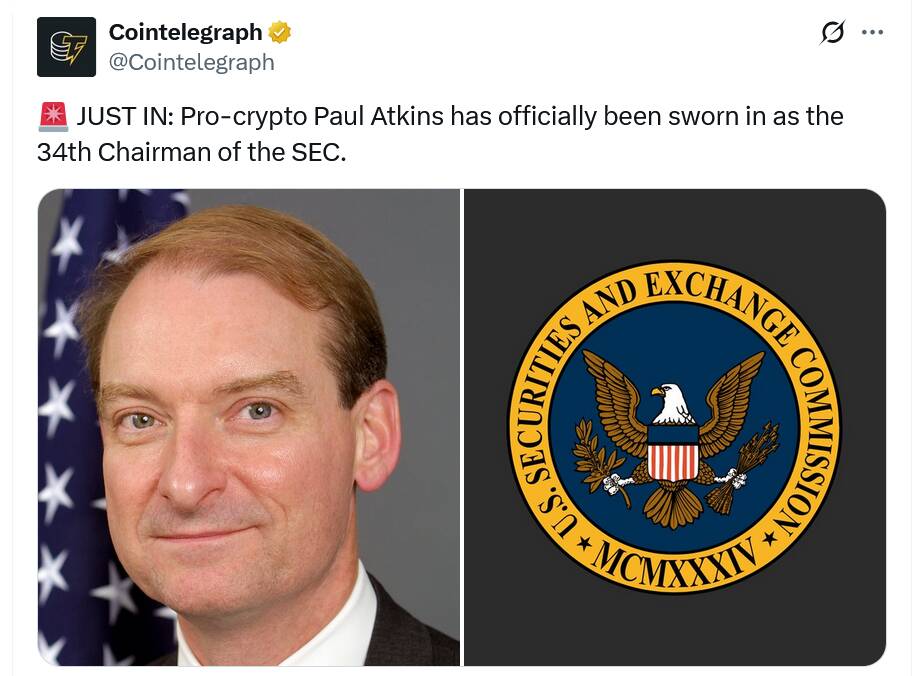In a significant development for the cryptocurrency landscape, Paul Atkins has been officially sworn in as the 34th chairman of the U.S. Securities and Exchange Commission (SEC). His appointment was confirmed by the Senate earlier this month in a closely contested vote and marks his return to the agency after previously serving as a commissioner from 2002 to 2008. Atkins expressed his gratitude for the opportunity and emphasized his commitment to enhancing investor protection and ensuring that the U.S. remains a secure environment for investment.
“I am honored by the trust and confidence President Trump and the Senate have placed in me to lead the SEC,” Atkins remarked during his swearing-in ceremony.
Atkins steps into this pivotal role with notable expectations of fostering a more crypto-friendly regulatory climate, contrasting the approach taken by former chair Gary Gensler. His confirmation had been delayed due to required financial disclosures linked to his family’s substantial wealth, which included investments valued at around $6 million in various crypto-related platforms.
His predecessor, acting chair Mark Uyeda, spearheaded the establishment of a Crypto Task Force aimed at bridging relationships between the SEC and crypto industry stakeholders. Under Atkins’ leadership, there has already been a noticeable shift, with the SEC dismissing multiple crypto-related probes initiated during Gensler’s tenure, impacting prominent companies like Coinbase and Uniswap.
As the SEC gears up for a busy year ahead, it currently faces over 70 applications for crypto-related exchange-traded funds (ETFs). Analysts have likened the situation to a “spaghetti cannon approach,” where issuers are hopeful that various products will find favor with the new leadership. With a diverse range of cryptocurrencies being considered, including popular names like XRP and Litecoin, the unfolding year promises to be an exciting one for investors and market watchers alike.
Paul Atkins Sworn in as SEC Chairman: Implications for Cryptocurrency
On April 21, 2023, Paul Atkins was officially sworn in as the 34th chairman of the U.S. Securities and Exchange Commission (SEC). Here are the key points regarding his appointment and its potential impact:
- Confirmation Details:
- Atkins’ appointment was confirmed by the U.S. Senate in a 52-44 vote on April 9, 2023.
- His confirmation had been delayed due to financial disclosures related to his marriage into a billionaire family.
- Leadership Goals:
- Atkins aims to ensure that the U.S. remains the best and most secure location for investment and business.
- His priorities include facilitating capital formation, maintaining fair markets, and protecting investors.
- Crypto-Friendly Approach:
- Atkins is expected to lead a more crypto-friendly SEC compared to former chair Gary Gensler.
- There has been a dismissal of several crypto probes and enforcement actions from Gensler’s tenure.
- Under Atkins, the SEC has established a Crypto Task Force to foster better relationships with the crypto industry.
- Crypto ETF Filings:
- The SEC currently has over 70 crypto-related exchange-traded fund (ETF) applications to evaluate this year.
- The increased rate of ETF filings indicates a “spaghetti cannon approach,” with various issuers testing new products to see what might gain approval under the new leadership.
“Together we will work to ensure that the U.S. is the best and most secure place in the world to invest and do business.” – Paul Atkins
These developments in regulatory leadership and actions may have significant implications for investors and businesses in the cryptocurrency space, impacting investment strategies and the overall market dynamics.
Paul Atkins Takes the Helm: A New Era for the SEC and Crypto Regulation
The recent appointment of Paul Atkins as the 34th chairman of the US Securities and Exchange Commission (SEC) signals a potentially transformative shift in how the agency approaches cryptocurrency regulation. Unlike the previous leadership under Gary Gensler, which was characterized by stringent oversight and enforcement actions, Atkins is anticipated to adopt a more accommodating stance towards the crypto industry. This new direction could have far-reaching implications for various stakeholders in the financial landscape.
Competitive Advantages: One of the most notable advantages of Atkins’ leadership is the momentum for a more crypto-friendly SEC. With over 70 applications for crypto-related exchange-traded funds (ETFs) awaiting approval, the shift in regulatory attitude is likely to invigorate crypto markets and foster investor confidence. Atkins’ experience as an SEC commissioner and familiarity with the complexities of the crypto landscape provide a strong foundation for advancing the agency’s mission to facilitate capital formation, which is essential for innovation in the sector.
Moreover, the dismissal of several investigations initiated under Gensler, including those involving prominent companies like Coinbase and Uniswap, opens the door for these firms to operate with less fear of regulatory overreach. The approach hinted at by Atkins could create a more productive dialogue between the SEC and crypto businesses, improving relations and encouraging collaboration to establish clearer regulatory guidelines.
Disadvantages and Potential Risks: However, this pivot towards a more lenient regulatory environment may not be without its challenges. The past controversies surrounding crypto investments and their associated volatility could pose risks for investors, especially if the SEC’s oversight diminishes. The “spaghetti cannon approach” to ETF filings suggests a trial-and-error strategy that might lead to regulatory confusion or inconsistency as various products are tested in the market. Critics could argue that such an approach may endanger investor protection and market integrity if unregulated entities proliferate without proper oversight.
This shift may benefit innovative startups and established players in the crypto industry looking for a more welcoming regulatory climate. However, it could present problems for traditional financial institutions and investors who thrive in environments with stringent regulatory frameworks. These stakeholders may feel uncertain about how reduced oversight could affect the stability and security of their investments.
Overall, the transition to Atkins’ leadership unlocks significant opportunities while also presenting challenges that various market participants will need to navigate carefully as they adapt to the evolving regulatory landscape under the SEC.

















